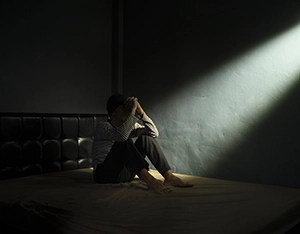Do you feel like you’re constantly struggling with OCD or social anxiety? Are you finding it difficult to overcome these conditions on your own? If so, don’t worry – you’re not alone. In this blog post, we will discuss some of the best ways to overcome OCD and social anxiety. We’ll also discuss the connection between these two conditions and some helpful tips for dealing with these conditions. So let’s get started!
Contents
Understanding OCD And Social Anxiety
 OCD and social anxiety are two different conditions, but they can both lead to overwhelming fear and worry.
OCD and social anxiety are two different conditions, but they can both lead to overwhelming fear and worry.
Obsessive-Compulsive Disorder (OCD) is a mental health disorder that causes unwanted or intrusive thoughts (obsessions) which can then lead to repetitive behaviors (compulsions). People with OCD are often preoccupied with thoughts of contamination, orderliness, mistakes, or danger.
Social anxiety disorder (SAD) is an extreme fear or worry of being judged, embarrassed, or humiliated in social situations. People with SAD often feel like they are constantly “on display”. And can become overwhelmed by feelings of inadequacy, inferiority, and self-consciousness.
It is important to understand and have an overview of these conditions in order to know how to best cope with them.
Are OCD And Social Anxiety Connected?
OCD and social anxiety are closely connected. People with OCD often experience intense feelings of fear, worry, and discomfort in social situations. They may become consumed by thoughts of what others think about them or how they will behave in certain settings.
At the same time, people with social anxiety may be plagued by intrusive thoughts or images related to the fear of being judged or embarrassed by others. This can be especially debilitating for those with existing OCD tendencies as it further reinforces their irrational fears and worries.
In addition, the connection between OCD and social anxiety is further reinforced due to the fact. People with either disorder may feel like they need to avoid certain triggers or situations in order to reduce their stress or distress.
The good news is that both OCD and social anxiety are treatable conditions. Therefore, if you or someone you know is suffering from both disorders, there are a few steps that can be taken to help manage and overcome these conditions.
Can OCD Cause Social Isolation?
While it’s common for people with OCD to feel socially isolated, the disorder itself does not cause social isolation. However, some of the obsessive thoughts and compulsive behaviors associated with OCD can make it difficult to interact with others in social situations.
For example, an individual may be so focused on intrusive thoughts that they are unable to engage in conversation. Or they may have difficulty leaving their home or engaging in activities with others due to fear of contamination.
In fact, the fear of social situations is a common symptom of OCD. This fear can lead to social anxiety, which often affects the ability to function in everyday activities. Therefore, OCD can definitely cause social isolation in certain circumstances.
Fortunately, there are a number of strategies that can be used to help manage OCD and social anxiety. Henceforth, do not lose hope or give up!
Consequences And Risk Factors
 There could be some serious consequences associated with OCD and social anxiety, such as:
There could be some serious consequences associated with OCD and social anxiety, such as:
- Decrease in productivity: One of the common effects of OCD is an inability to concentrate and focus on tasks. This can lead to a decrease in productivity and performance at work or school.
- Depression: The constant struggle with anxiety and obsessive thoughts can cause individuals to become depressed as they feel overwhelmed by their circumstances and powerless to change them.
- Relationship difficulties: Fear of social situations can lead to difficulty forming and maintaining relationships.
In addition, there are a few risk factors that increase the likeliness of developing OCD and social anxiety, such as:
- Genetics: There is evidence that suggests that OCD and social anxiety can be hereditary. If a family member has experienced some form of the disorder, it’s possible to have an increased risk of developing it.
- Traumatic experiences: Trauma in childhood or adulthood increases the chance of developing an anxiety-related disorder.
- Stressful life events: Stress can increase the chances of developing OCD and social anxiety.
- Brain chemistry: This refers to a person’s unique brain chemistry. Imbalances in certain neurotransmitters can lead to OCD and social anxiety.
So these are the consequences and risk factors. It is important to be aware of these so that you can take the necessary steps to prevent them from occurring. With the right knowledge and support, it is possible to manage OCD and social anxiety.
How Do I Overcome OCD And Social Anxiety?
There are a number of strategies that can be used to help manage OCD and social anxiety. Here are some tips:
Get Educated
It is one of the foremost steps to be aware of your condition and its symptoms. Learn about the causes, triggers, diagnosis, and treatment options. There are several online resources, books, and support groups that can provide helpful information.
Establish Goals
Create realistic goals that you can work towards to make progress in managing OCD and social anxiety. Make sure they are achievable and provide yourself with incentives when you reach them. For instance, if your goal is to go out and socialize, reward yourself with something special afterward.
Develop Healthy Habits
OCD and social anxiety can cause unhealthy behaviors, such as avoidance and procrastination. Develop healthy habits that will help you cope with stress and manage your condition. This could include regular exercise, healthy eating, mindfulness techniques, or relaxation strategies.
Find Support
Surround yourself with positive people who can offer understanding and support for managing OCD and social anxiety. Don’t be afraid to ask for help from friends, family, and mental health professionals. Because with support right by your side, you can face any challenge ahead.
Positive Self-Talk
During times of stress, it is important to engage in positive self-talk. This can increase your sense of control over the situation and help you better manage your anxiety. Start by recognizing situations where a negative thought enters your mind. Then replace those thoughts with positive ones such as “I can do this” or “My opinion is all that matters.” It may help to practice these new thought patterns in a safe environment.
Meditation and Mindfulness
It is always believed to focus on the present moment, free of judgment and expectations. Meditation can help you recognize your triggers and create new coping mechanisms to manage them. Start by sitting comfortably in a quiet space with your eyes closed and take long, deep breaths. Notice how your body feels and focus on releasing any tension or stress that is built up. Repeat positive affirmations like “I am in control of my thoughts” and “I am enough.”
Seek Professional Help
If the symptoms of OCD and social anxiety seem to be taking over your life, it’s important to seek professional help. A mental health professional can help you develop effective coping strategies and work with you to create a treatment plan that works for your individual needs. Various treatment options are available, such as psychotherapy and medication.
Practice Self-Care
 Taking time for yourself is an integral component of managing OCD and social anxiety. Make sure to get plenty of rest, eat well-balanced meals, and engage in calming activities such as yoga or meditation. Regular exercise can also help reduce symptoms of anxiety. Taking regular breaks from stressful situations is important for managing your emotions, so make sure to incorporate some form of self-care into your daily routine.
Taking time for yourself is an integral component of managing OCD and social anxiety. Make sure to get plenty of rest, eat well-balanced meals, and engage in calming activities such as yoga or meditation. Regular exercise can also help reduce symptoms of anxiety. Taking regular breaks from stressful situations is important for managing your emotions, so make sure to incorporate some form of self-care into your daily routine.
By following these tips, you can start to take control of your OCD and social anxiety symptoms and lead a healthier and more fulfilling life. Remember that it takes time to overcome OCD and social anxiety, so don’t be discouraged if you don’t see immediate results. With patience and perseverance, you can greatly reduce the impact these conditions have on your life.
Conclusion
In a nutshell, OCD and social anxiety can be difficult to overcome, but it is possible. These conditions are often rooted in underlying issues, such as stress and depression, which can be addressed through therapy and/or medication.
With the right knowledge and support, people can find strategies that work for them to reduce their symptoms and lead a more fulfilling life. Thus, be sure to take the necessary steps to identify your own triggers, develop healthy coping mechanisms, and seek the help you need.
For more information and guidance, please contact OCDMantra. OCD is a mental health disorder characterized by obsessions and compulsions. If you have any queries regarding OCD treatment, ERP therapy experienced therapists at OCDMantra can help: Book a trial OCD therapy session


